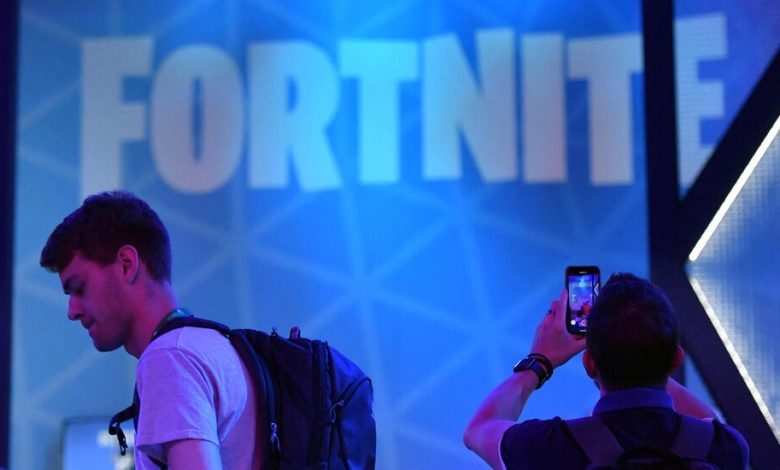Google’s Antitrust Setback Could Remake the Mobile App World


Epic Games, the maker of Fortnite, scored a big antitrust victory against Google yesterday that could upend the economics around apps stores.Credit…Ina Fassbender/Agence France-Presse — Getty Images
A new world for Google’s app store
Epic Games on Monday finally achieved one of its longstanding goals: weakening one of the two major companies behind the modern mobile app ecosystem. A jury found that Google violated antitrust laws by maintaining tight control of its app store, harming the Fortnite maker and other developers.
Google said it would appeal. But the verdict could rewrite the economics of mobile apps — and is a blow against the power of Big Tech.
The back story: In 2020,Epic encouraged Fortnite players to buy in-game items directly from it to protest against Apple and Google taking cuts of all in-app payments made via their app store payment systems. The tech giants briefly banned the popular game from their stores, and Epic sued both.
Apple won its lawsuit in 2021, though that trial was decided by a judge, not a jury. Epic persisted with its case against Google, even after other plaintiffs like the dating app operator Match dropped out.
The jury took less than four hours to decide against the search giant. It found that the company broke antitrust laws with both its Play Store and an in-app billing system. It also found that Google had put unreasonable constraints on other app store operators’ ability to compete — including via Project Hug, an initiative that paid developers big sums to keep their apps on the Play Store.
“Free Fortnite!” Tim Sweeney, Epic’s C.E.O., posted on the social media platform X after the verdict. (His company reckons that it could keep hundreds of millions of dollars in additional revenue if it won.)
Epic wants to open up Google’s devices, not monetary damages. That includes forcing the company to allow other app stores on its Android phones and tablets. Developers may also have new ways of charging users without having to fork over a cut to Google.
That said, a judge will determine actual remedies next year. A Google spokesman said the company would “continue to defend the Android business model.” (It’s unclear what the decision means for Apple, whose case over Epic may go to the Supreme Court.)
It’s a blow to Google as it faces pressure from Washington and beyond. The app store, which accounted for about $12 billion in operating profit in 2021, makes up just a portion of the company’s bottom line.
But Google is fighting to protect some of its biggest moneymakers. It’s battling the Justice Department and dozens of states over its dominance in search. And it is seeking to defend its advertising technology business against E.U. regulators’ efforts to break up the division.
HERE’S WHAT’S HAPPENING
The Donald Trump immunity question heads to the Supreme Court. Justices on Monday agreed to examine whether the former president is shielded from prosecution. Jack Smith, the special counsel prosecuting Trump on charges of plotting to overturn the 2020 election, made the request ahead of a potential appeals court decision that could delay or sidetrack his case.
Hasbro announces big layoffs two weeks before Christmas. The toymaker behind Monopoly and Magic: The Gathering said it would cut roughly 1,100 jobs, or nearly 17 percent of its work force, as toy sales continue to slide since coronavirus pandemic-driven highs. Separately, EY reportedly plans to lay off dozens of its U.S. partners amid slowing business.
Choice Hotels is said to plan a hostile bid for Wyndham. The hotel operator will begin an exchange offer for Wyndham shares and name a slate of directors for its rival’s board, according to The Wall Street Journal. The action comes after Choice’s previous takeover approach was rebuffed.
More twists in the saga of Shohei Ohtani’s record-breaking contract. The M.L.B. star will defer all but $2 million of the $70 million he’s owed each year by the Los Angeles Dodgers until his 10-year contract ends, The Athletic reports. The move is meant to help the team navigate the league’s luxury tax.
A key update in the inflation battle
The latest Consumer Price Index report — due out at 8:30 a.m. Eastern — is expected to show little progress in the fight to bring down inflation, adding uncertainty to the Fed’s long-term policy on interest rates.
The numbers to watch: Economists have forecast that overall C.P.I. rose 3.1 percent on an annual basis in November, a slight decrease from the October reading. Core inflation, which excludes volatile items like food, is expected to come in at 4 percent, showing no improvement from the previous month’s report.
Wall Street has had to absorb mixed signals on inflation. Last month’s C.P.I. report undercut analysts’ estimates, setting off a rally in stocks and bonds that pushed the S&P 500 to a 20-month high, as investors became more optimistic that the Fed was done raising borrowing costs.
But Friday’s jobs report showed strong hiring and wage gains in November. That could make Fed officials more cautious about their 2024 rates outlook.
The central bank is expected to leave its prime lending rate unchanged tomorrow, at its final meeting of the year. But questions abound about what comes next, making Tuesday’s C.P.I. report an even more important gauge.
On Tuesday morning, traders were pricing in a roughly 80 percent chance of a rate cut by May. But cutting rates while inflation remains above the Fed’s 2 percent inflation target could have damaging effects on long-term growth.
Investors got some hopeful news on Monday. The New York Fed’s monthly inflation survey showed respondents at their most optimistic about the path of consumer prices since April 2021, helped by lower gasoline prices and education costs.
How Penn’s crisis unfolded
Harvard’s president, Claudine Gay, is expected to survive efforts to push her out amid an uproar over her stance on combating antisemitism on campus. But new details are emerging of how one of her peers lost her job over the controversy.
Big donors to the University of Pennsylvania waged an aggressive and sustained campaign against Liz Magill, the school’s president, and Scott Bok, the chairman of its board of trustees. Magill stepped down on Saturday, and Bok resigned soon after.
An activist campaign was waged at Penn. Marc Rowan, the private equity billionaire who chairs the advisory board of Wharton, Penn’s business school, spearheaded the effort in public and private. Rowan cut his donations and urged others to do the same — and emailed Penn’s board daily.
As one trustee told The Wall Street Journal: “It’s like running a proxy fight against your own company.”
The campaign extended beyond Penn. Wall Street bankers threatened to avoid doing business with Bok, who was also the chair and C.E.O. of the boutique investment bank Greenhill. Apollo reportedly even tried to thwart the sale of Greenhill to Mizuho of Japan by suggesting that Bok’s leadership at Penn was bad for Greenhill. (The $550 million deal still closed this month.)
Magill’s disastrous House testimony last week was a turning point. By Saturday, Magill and Bok had lost the support of Penn’s board. Several trustees decided that their vice chair, Julie Platt, and William Lauder, the heir to a cosmetics fortune, should ask Magill and Bok to quit.
Magill and Bok found out and announced their resignations before they were pushed out.
Big questions remain, including:
-
What does this mean for Bok?Will his peers welcome him back, and will Mizuho stand by him?
-
Is Rowan done?As Magill’s tenure neared its end, Rowan told some Wharton board members that he was wary of continuing to speak out publicly, claiming to be worried about the perception that he and other donors helped oust her. But will he get involved in other big decisions, like picking Penn’s next president?
“He may be at the very top of the list as the worst person I’ve ever seen do a cross-examination.”
— David Mills, the Stanford University law professor who led the defense of the FTX founder Sam Bankman-Fried as a favor to the crypto entrepreneur’s parents.
No deal (yet) at COP28
The United Nations climate summit in Dubai was supposed to wrap up on Tuesday morning, but a fierce debate over whether to phase out fossil fuels has pushed negotiators to the brink of a no-deal.
A draft proposal was labeled a “death warrant.” It calls for cuts in the “consumption and production of fossil fuels” by 2050. But that doesn’t go far enough for some governments, including the European Union and a number of island nations vulnerable to rising sea levels. “The Republic of the Marshall Islands did not come here to sign our death warrant,” said a minister from the Pacific country.
The proposed agreement confirmed the worst fears of climate activists, green investors and scientists, who were skeptical that an event held in an oil-dependent country would achieve meaningful progress on cutting fossil fuel use. Al Gore, the former vice president, said on Monday that the draft agreement read “as if OPEC dictated it word for word.” It was “Of the Petrostates, By the Petrostates and For the Petrostates,” he said.
The “phase-out” camp wants nothing short of elimination of fossil fuel use, to limit global warming to 1.5 to 2 degrees Celsius. But Saudi Arabia and other oil-exporting nations strongly oppose such pronouncements in any final agreement, and the draft text seemed more in line with their thinking. It referenced, for example, an “orderly” or “just” reduction of fossil fuels.
The host nation is trying to break the impasse. Sultan Al Jaber, the event’s president who also runs Abu Dhabi’s national oil company, delayed publication of the draft agreement while a compromise was sought. But that was looking unlikely on Tuesday.
The summit has made some progress. Calls to triple renewables as an energy source by 2030 have been cheered by countries and business leaders. There have also been big commitments to ramp up nuclear energy capacity, but skeptics remain wary.
THE SPEED READ
Deals
-
The investment firm General Atlantic has filed confidentially for an initial public offering, DealBook has confirmed, though any move to go public is far from imminent. (DealBook, Bloomberg)
-
The private equity giant KKR is reportedly near a deal to buy half of Cotiviti, a health care technology company, at a valuation of up to $11 billion. (Bloomberg)
Policy
-
Emmanuel Macron, France’s president, warned that the European Union’s A.I. Act could hurt Europe’s artificial intelligence companies’ ability to compete against global rivals. (FT)
Best of the rest
-
Are the boom times over for Kirkland & Ellis, the world’s most profitable law firm? (FT)
-
The publisher of Sports Illustrated fired Ross Levinsohn as C.E.O. after a controversy over articles published under fake author names with fake author biographies. (Futurism)
-
Ford is reportedly halving production of its F-150 Lightning pickup truck next year, as carmakers confront weaker-than-expected demand for electric vehicles. (Automotive News)
-
“Inside the World Excel Championships (Yes, You Read That Right)” (WSJ)
We’d like your feedback! Please email thoughts and suggestions to [email protected].




